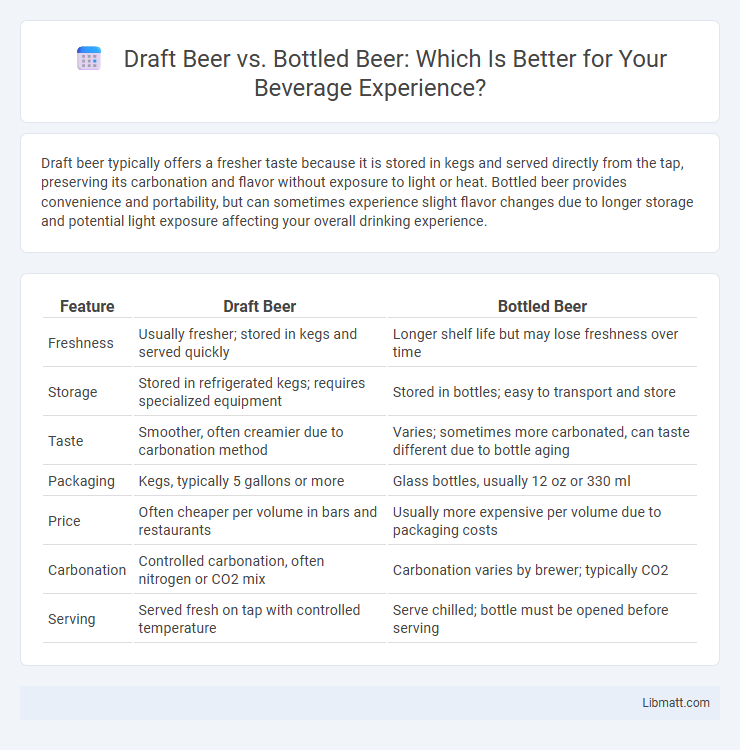Draft beer typically offers a fresher taste because it is stored in kegs and served directly from the tap, preserving its carbonation and flavor without exposure to light or heat. Bottled beer provides convenience and portability, but can sometimes experience slight flavor changes due to longer storage and potential light exposure affecting your overall drinking experience.
Table of Comparison
| Feature | Draft Beer | Bottled Beer |
|---|---|---|
| Freshness | Usually fresher; stored in kegs and served quickly | Longer shelf life but may lose freshness over time |
| Storage | Stored in refrigerated kegs; requires specialized equipment | Stored in bottles; easy to transport and store |
| Taste | Smoother, often creamier due to carbonation method | Varies; sometimes more carbonated, can taste different due to bottle aging |
| Packaging | Kegs, typically 5 gallons or more | Glass bottles, usually 12 oz or 330 ml |
| Price | Often cheaper per volume in bars and restaurants | Usually more expensive per volume due to packaging costs |
| Carbonation | Controlled carbonation, often nitrogen or CO2 mix | Carbonation varies by brewer; typically CO2 |
| Serving | Served fresh on tap with controlled temperature | Serve chilled; bottle must be opened before serving |
Introduction to Draft Beer and Bottled Beer
Draft beer is served from kegs through taps, preserving freshness and enhancing flavor due to minimal exposure to light and air. Bottled beer is packaged in sealed bottles, allowing longer shelf life and convenient storage but may experience slight flavor changes from light and oxygen exposure. Your choice between draft and bottled beer influences taste, carbonation, and overall drinking experience.
The Brewing and Packaging Process
Draft beer is often brewed in larger batches and packaged directly into kegs, preserving freshness by minimizing exposure to light and oxygen during the process. Bottled beer undergoes additional packaging steps, including bottling and sealing, which may slightly reduce freshness due to potential oxidation. Understanding the difference helps you appreciate how these processes impact flavor and quality in your beer experience.
Flavor Profile Differences
Draft beer typically offers a fresher, more vibrant flavor profile due to minimal exposure to light and oxygen, preserving the brewer's intended taste nuances and carbonation levels. Bottled beer can develop subtle alterations in taste and aroma over time, influenced by bottle conditioning, possible lightstruck flavors, and varying storage conditions. Consumers often perceive draft beer as smoother and more aromatic, while bottled beer may exhibit more complex, matured notes depending on the style and aging process.
Freshness and Shelf Life
Draft beer offers superior freshness compared to bottled beer due to minimal exposure to light and oxygen, which helps preserve its natural flavors and carbonation. Bottled beer typically has a longer shelf life, often ranging from six months to a year, but can lose taste quality faster once opened or improperly stored. Choosing draft beer enhances Your drinking experience with a crisp, vibrant taste that stays consistent when served promptly.
Serving Experience and Presentation
Draft beer offers a fresher taste due to its direct pour from kegs, maintaining optimal carbonation and temperature, which enhances Your overall serving experience. The presentation of draft beer typically features a thicker, creamier head in a chilled glass, creating an appealing visual and sensory impact. Bottled beer, while convenient and portable, often lacks the same level of freshness and presentation consistency found in draft servings.
Environmental Impact and Sustainability
Draft beer generally has a lower environmental impact compared to bottled beer due to reduced packaging waste and lower carbon emissions in transportation. Kegs used for draft beer are reusable and require less energy-intensive production than single-use bottles, significantly decreasing resource consumption. Additionally, the refrigeration efficiency for draft systems often surpasses that of bottled beer distribution, further enhancing its sustainability profile.
Cost Considerations
Draft beer generally offers better cost efficiency compared to bottled beer due to lower packaging and transportation expenses. Bars and restaurants can save money on bulk draft beer kegs, passing savings onto Your glass, while bottled beer often incurs higher per-unit costs because of individual packaging. Choosing draft beer can maximize value without compromising quality, making it a budget-friendly option for both venues and consumers.
Social and Cultural Factors
Draft beer often holds a social and cultural significance in pubs and bars, symbolizing tradition and communal experiences where people gather for celebrations or casual meetups. Bottled beer offers convenience and portability, fitting modern lifestyles and individual consumption outside social venues. Your choice between draft and bottled beer can reflect preferences for shared social rituals or personal enjoyment.
Availability and Accessibility
Draft beer is commonly available in bars, pubs, and restaurants, offering fresher taste due to its storage in kegs and controlled serving conditions. Bottled beer provides greater accessibility as you can easily purchase it from supermarkets, convenience stores, and liquor shops for home consumption. When choosing between the two, consider your preferred drinking environment and convenience for Your beer experience.
Which Is Better: Draft Beer or Bottled Beer?
Draft beer typically offers a fresher taste due to its quicker turnover and less exposure to light and oxygen, preserving the beer's original flavors and aromas. Bottled beer provides portability and longer shelf life, but may experience slight flavor degradation depending on storage conditions. Your preference depends on whether you prioritize freshness and flavor intensity or convenience and preservation.
Draft beer vs bottled beer Infographic

 libmatt.com
libmatt.com